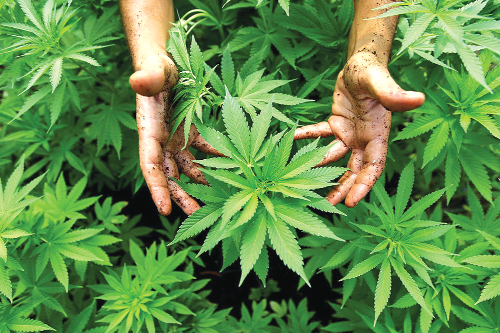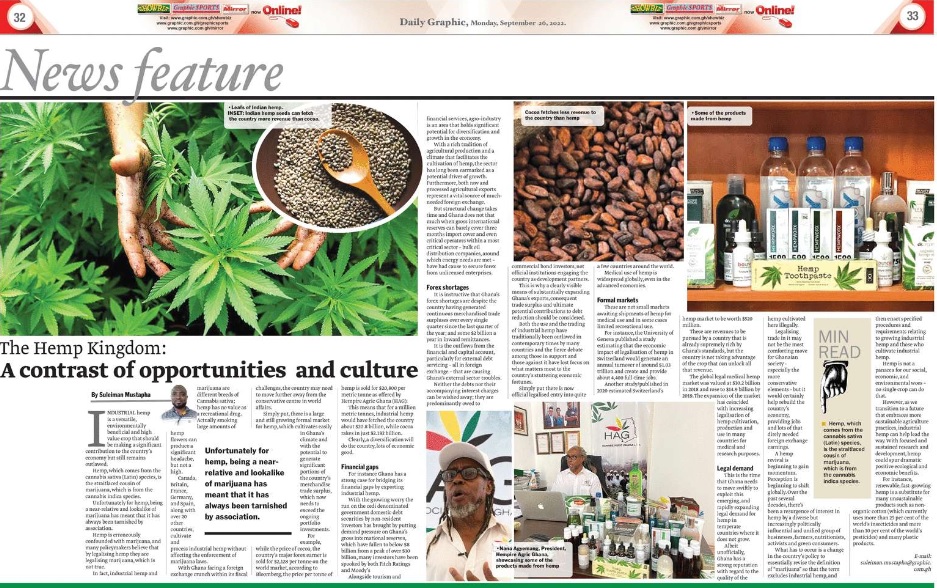
The Hemp Kingdom: A contrast of opportunities and culture
Industrial hemp is a versatile, environmentally beneficial and high value crop that should be making a significant contribution to the country’s economy but still remains outlawed.
Hemp, which comes from the cannabis sativa (Latin) species, is the straitlaced cousin of marijuana, which is from the cannabis indica species.
Advertisement
Unfortunately for hemp, being a near-relative and lookalike of marijuana has meant that it has always been tarnished by association.
Hemp is erroneously confounded with marijuana, and many policymakers believe that by legalising hemp they are legalising marijuana, which is not true.
In fact, industrial hemp and marijuana are different breeds of Cannabis sativa; hemp has no value as a recreational drug. Actually smoking large amounts of hemp flowers can produce a significant headache, but not a high.
Canada, Britain, France, Germany, and Spain, along with over 20 other countries, cultivate and process industrial hemp without affecting the enforcement of marijuana laws.
With Ghana facing a foreign exchange crunch within its fiscal challenges, the country may need to move further away from the conservative centre in world affairs.
CLICK THIS LINK FOR MORE ON THIS ARTICLE

Simply put, there is a large and still growing formal market for hemp, which cultivates easily in Ghana’s climate and with the potential to generate significant portions of the country’s merchandise trade surplus, which now needs to exceed the ongoing portfolio investments.
For example, while the price of cocoa, the country’s major forex earner is sold for $2,128 per tonne on the world market, according to Bloomberg, the price per tonne of hemp is sold for $20,800 per metric tonne as offered by Hempire Agric Ghana (HAG).
This means that for a million metric tonnes, industrial hemp would have fetched the country about $20.8 billion, while cocoa rakes in just $2.182 billion.
Clearly, a diversification will do the country, lots of economic good.
Financial
For instance Ghana has a strong case for bridging its financial gaps by exporting industrial hemp.
With the growing worry the run on the cedi denominated government domestic debt securities by non-resident investors has brought by putting demand pressure on Ghana’s gross international reserves, which have fallen to below $8 billion from a peak of over $10 billion, many investors have been spooked by both Fitch Ratings and Moody’s
Alongside tourism and financial services, agro-industry is an area that holds significant potential for diversification and growth in the economy.
With a rich tradition of agricultural production and a climate that facilitates the cultivation of hemp, the sector has long been earmarked as a potential driver of growth. Furthermore, both raw and processed agricultural exports represent a vital source of much-needed foreign exchange.
But structural change takes time and Ghana does not that much when gross international reserves can barely cover three months import cover and even critical operators within a most critical sector – bulk oil distribution companies, around which energy needs are met – have had cause to secure forex from unlicensed enterprises.

CLICK THIS LINK FOR MORE ON THIS ARTICLE
Forex shortages
It is instructive that Ghana’s forex shortages are despite the country having generated continuous merchandised trade surpluses over every single quarter since the last quarter of the year; and some $2 billion a year in inward remittances.
It is the outflows from the financial and capital account, particularly for external debt servicing – all in foreign exchange – that are causing Ghana’s external sector troubles.
Neither the debts nor their accompanying interest charges can be wished away; they are predominantly owed to commercial bond investors, not official institutions engaging the country as development partners.
This is why a clearly visible means of substantially expanding Ghana’s exports, consequent trade surplus and ultimate potential contributions to debt reduction should be considered.
Both the use and the trading of industrial hemp have traditionally been outlawed in contemporary times by many countries and the fierce debate among those in support and those against it have lost focus on what matters most to the country’s stuttering economic fortunes.
Simply put there is now official legalised entry into quite a few countries around the world.
Medical use of hemp is widespread globally, even in the advanced economies.
Formal markets
These are not small markets awaiting shipments of hemp for medical use and in some cases limited recreational use.
For instance, the University of Geneva published a study estimating that the economic impact of legalisation of hemp in Switzerland would generate an annual turnover of around $1.03 trillion and create and provide about 4,400 full-time jobs.
Another study/published in 2020 estimated Switzerland’s hemp market to be worth $520 million.
These are revenues to be pursued by a country that is already supremely rich by Ghana’s standards, but the country is not taking advantage of the crop that can unlock all that revenue.
The global legal medical hemp market was valued at $10.2 billion in 2018 and rose to $14.9 billion by 2019. The expansion of the market has coincided with increasing legalisation of hemp cultivation, production and use in many countries for medical and research purposes.
Legal demand
This is the time that Ghana needs to move swiftly to exploit this emerging, and rapidly expanding legal demand for hemp in temperate countries where it does not grow.
Albeit unofficially, Ghana has a strong reputation with regard to the quality of the hemp cultivated here illegally.
Legalising trade in it may not be the most comforting move for Ghanaian society - especially the more conservative elements - but it would certainly help rebuild the country’s economy, providing jobs and lots of that direly needed foreign exchange earnings.
A hemp revival is beginning to gain momentum. Perception is beginning to shift globally. Over the past several decades, there’s been a resurgence of interest in hemp by a diverse but increasingly politically influential and unified group of businesses, farmers, nutritionists, activists and green consumers.
What has to occur is a change in the country’s policy to essentially revise the definition of “marijuana” so that the term excludes industrial hemp, and then enact specified procedures and requirements relating to growing industrial hemp and those who cultivate industrial hemp.
Hemp is not a panacea for our social, economic, and environmental woes – no single crop can do that.
However, as we transition to a future that embraces more sustainable agriculture practices, industrial hemp can help lead the way. With focused and sustained research and development, hemp could spur dramatic positive ecological and economic benefits.
For instance, renewable, fast-growing hemp is a substitute for many unsustainable products such as non-organic cotton (which currently uses more than 25 per cent of the world’s insecticides and more than 10 per cent of the world’s pesticides) and many plastic products.
CLICK THIS LINK FOR MORE ON THIS ARTICLE
E-mail: [email protected]




